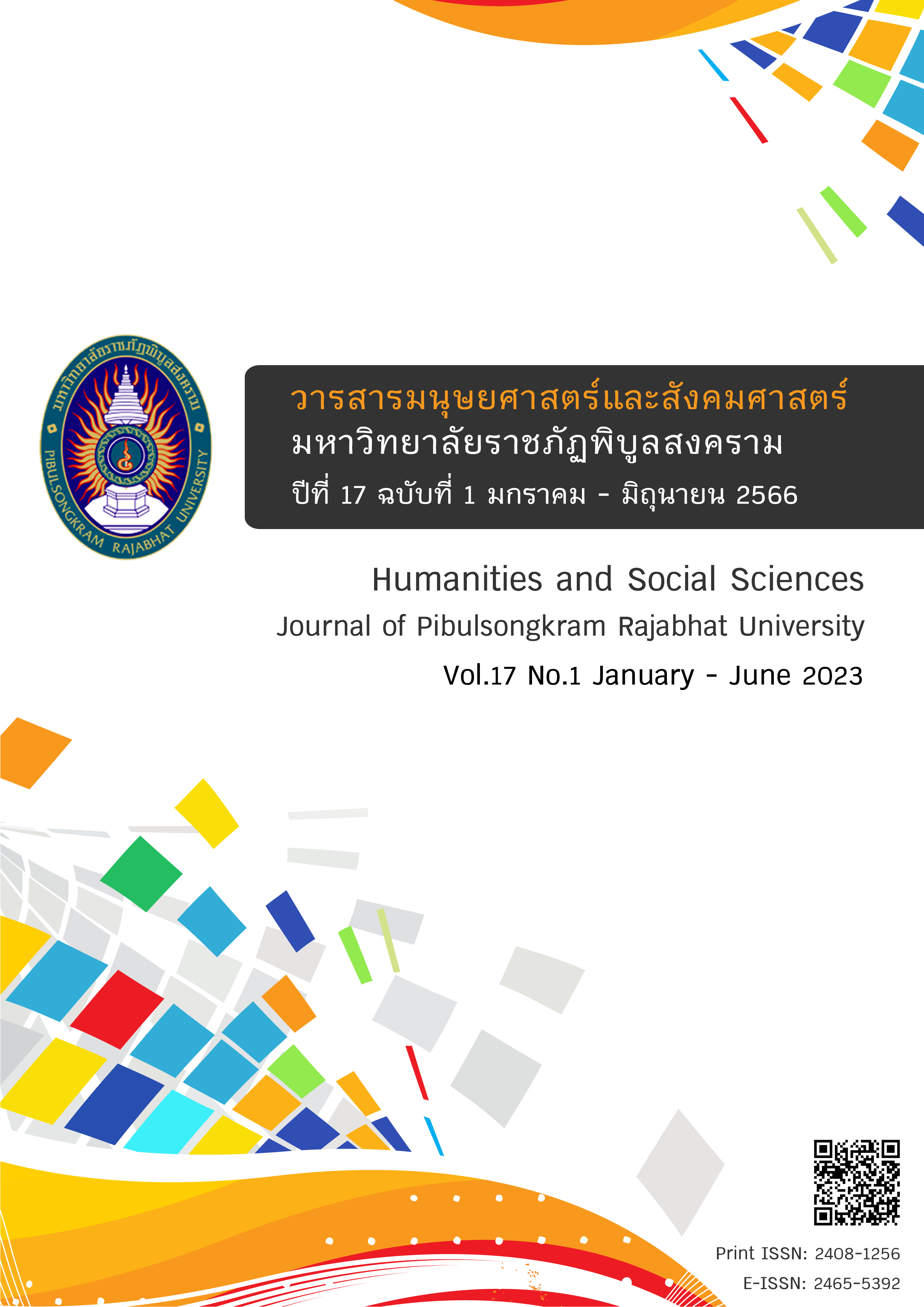Institutional Logics in Child Rearing: A Case Study of Cha-am District, Phetchaburi Province
DOI:
https://doi.org/10.14456/psruhss.2023.13Keywords:
Developmental delay, Early childhood, Institutional logicAbstract
The objectives of this research were: 1) to study the relationship between family determinants and child development, 2) to examine the field of child rearing, and 3) to investigate and analyze the sets of institutional logics found in the child-rearing field relating to developmental delay. The methodology is mixed-method research by applying qualitative and quantitative research. The samples of quantitative research were 396 caregivers of children. The quantitative analysis included frequency, percent, Chi-Square Test, Logistic Regression, and Discriminant Analysis. The target groups of qualitative research were 18 families of children with developmental delays. The qualitative analysis included content analysis and causal analysis by using Mill’s Methods. It was found that 33.3% of the sample experienced developmental delays. The factors related to child development including 1) main caretaker’s income, 2) employment status of the main caretaker, 3) the number of children in a family, 4) the number of the main caretaker, the relation between children and the main caretakers, and elderly relative in the family. According to the institutional logics relating to the children with developmental delays, results show that the community logic, market logic, and family logic associate with developmental delays in children. In contrast, professional logic associates with normal development in children. The public health organization may have to carry out the project about changing the attitudes of parents include 1) not allowing children to play on a smartphone too long, 2) training for children to help themselves, and 3) controlling children behaviors according to the situation.
References
แก้วตา นพมณีจำรัสเลิศ. (2559). การกระตุ้นพัฒนาการล่าช้าโดยครอบครัวมีส่วนร่วม. กรุงเทพฯ: ราชวิทยาลัยกุมารแพทย์แห่งประเทศไทย.
ชลทิศ อุไรฤกษ์กุล. (2558). การตรวจคัดกรองพัฒนาการเด็ก 42 เดือนในศูนย์เด็กเล็ก เขตสุขภาพที่ 5 วันที่ 5-10 กรกฎาคม 2558. สืบค้นจาก www.hpc4.go.th/director/dspm.
ดวงเดือน พันธุมนาวิน, อรพินทร์ ชูชม, และงามตา วนินทานนท์. (2528). ปัจจัยทางจิตวิทยานิเวศ ที่เกี่ยวกับการอบรมเลี้ยงดูเด็กของมารดาไทย. กรุงเทพฯ: มหาวิทยาลัยศรีนครินทรวิโรฒ.
ถนอมรัตน์ ประสิทธิเมตต์. (2557). พัฒนาการเด็กปฐมวัยไทย เขตบริการสุขภาพที่ 4. สระบุรี: ศูนย์อนามัยที่ 2.
นพวรรณ ศิริวงศ์พาณิชย์. (2560). เด็กที่มีความบกพร่องทางพัฒนาการ. สืบค้นจาก http://rajanukul. go.th.
นิชรา เรืองดารกานนท์. (2547). พัฒนาการและเชาวน์ปัญญาของเด็กไทย. กรุงเทพฯ: สำนักงานกองทุนสนับสนุนการวิจัย.
เยาวรัตน์ รัตน์นันต์. (2559). การศึกษาปัจจัยที่มีผลต่อพัฒนาการเด็กปฐมวัยไทย เขตสุขภาพที่ 8. ขอนแก่น: ศูนย์อนามัยที่ 7.
ลัดดา เหมาะสุวรรณ และคณะ. (2547). เด็กไทยวันนี้ เป็นอยู่อย่างไร โครงการวิจัยพัฒนาการแบบองค์รวมของเด็กไทย. กรุงเทพฯ: สำนักกองทุนสนับสนุนการวิจัย.
ศิริลักษณ์ พนมเชิง. (2556). ปัจจัยที่สัมพันธ์ในเด็กที่มีภาวะพูดช้ากว่าวัย แผนกผู้ป่วยนอกและคลินิก Well Baby แผนกส่งเสริมสุขภาพ โรงพยาบาลบางละมุง. วารสารกุมารเวชศาสตร์, 52(1), 44-55.
ศูนย์เทคโนโลยีสารสนเทศและการสื่อสาร. (2561). ฐานข้อมูลระบบสุขภาพ (Health Data Center Dashboard). สืบค้นจาก https://hdcservice.moph.go.th.
ศูนย์อนามัยที่ 1-12. (2558). สถานการณ์พัฒนาการเด็กปฐมวัยไทย. นนทบุรี: กรมอนามัย.
ศูนย์อนามัยที่ 9. (2558). เด็กเขต 9 พัฒนาการสมวัย IQ เกิน 100. สืบค้นจาก http://hpc9.anamai.
moph.go.th/ewt_dl_link.php?nid=655.
สกาวรัตน์ เทพรักษ์, ภภัสสร มุกดาเกษม, จรรยา สืบนุช, และ จารุณี จตุรพรเพิ่ม. (2557). การศึกษาปัจจัยด้านการเลี้ยงดูของผู้ปกครองและการมีส่วนร่วมของชุมชนต่อการส่งเสริมการเจริญเติบโตและพัฒนาการเด็กปฐมวัย ในเขตสาธารณสุขที่ 4 และ 5. ราชบุรี: ศูนย์อนามัยที่ 4
สถาบันพัฒนาอนามัยเด็กแห่งชาติ. (2560). สถานการณ์พัฒนาการเด็กไทย การสุ่มสำรวจ ปี 2560. นนทบุรี: กรมอนามัย.
สำนักงานคณะกรรมการการศึกษาแห่งชาติ. (2536). การศึกษาสภาพการอบรมเลี้ยงดูเด็กก่อนวัยเรียน. กรุงเทพฯ: สำนักงานคณะกรรมการการศึกษาแห่งชาติ.
สำนักตรวจและประเมินผล. (2560). แผนการตรวจราชการกระทรวงสาธารสุข ประจำปีงบประมาณ 2560. นนทบุรี: กระทรวงสาธารณสุข.
สุธรรม นันทมงคลชัย. (2547). การอบรมเลี้ยงดูเด็กของครอบครัวไทย: ข้อมูลจากการวิจัยเชิงคุณภาพและเชิงปริมาณ. กรุงเทพฯ: สำนักงานกองทุนสนับสนุนการวิจัย.
Arbona, A. P. Y. (2011). Adaptation in Families of Children with Developmental Delay. Arizona: Arizona State University. Retrieved from https://repository.asu.edu
Colaner, A. C. (2016). Education Versus Family: Institutional Logics in the Early Care and Education Field. American Educational Research Journal, 53(3), 673-707.
IPSR, & UNICEF. (2012). The Impact of Internal Migration on Early Childhood Well-Being and Development. Bangkok: Institute for Population and Social research and UNICEF Thailand Country Office.
Murray, G. K., Jones, P. B., Kuh, D., & Richards, M. (2007). Infant Developmental Milestones and Subsequent Cognitive Function. Annals of Neurology, 62(2), 128-136.
Norona, A. N., & Baker, B. L. (2017). The effects of early positive parenting and developmental delay status on child emotion dysregulation. Journal of Intellectual Disability Research, 61(2), 130-143.
Russell, J. L. (2011). From Child’s Garden to Academic Press: The Role of Shifting Institutional Logics in Redefining Kindergarten Education. American Educational Research Journal, 48(2), 236-267.
Teungfung. (2009). Parental Time Use for Child Rearing and Preschool Child Behavior: A Comparison between Urban and Rural Areas in Central Region. Bangkok: National Institute of Development Administration.
Thornton, P. H., Ocasio, W., & Lounsbury, M. (2012). The Institutional Logics Perspective. Oxford: Oxford University Press.
Westley, E. (2014). Associations between poverty, maternal experience of intimate partner violence, and developmental delay among 12-23 month-old children in Nicaragua. Washington: University of Washington.
Downloads
Published
How to Cite
Issue
Section
License
Copyright (c) 2021 Humanities and Social Sciences Journal of Pibulsongkram Rajabhat University

This work is licensed under a Creative Commons Attribution-NonCommercial-NoDerivatives 4.0 International License.
Any articles or comments appearing in the Journal of Humanities and Social Sciences, Rajabhat Phibulsongkram University, are the intellectual property of the authors, and do not necessarily reflect the views of the editorial board. Published articles are copyrighted by the Journal of Humanities and Social Sciences, Rajabhat Phibulsongkram University.









